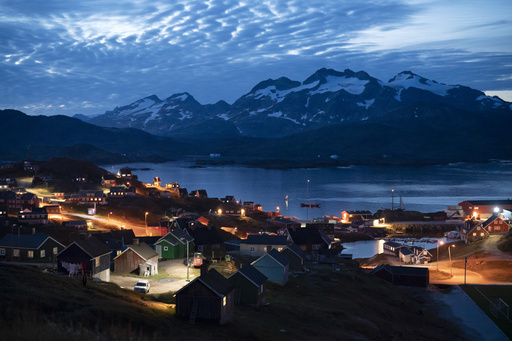WEST PALM BEACH, Fla. — In a surprising revival of interest, Donald Trump has once again expressed a desire to acquire Greenland from Denmark, mirroring his previous attempts during his initial term. This renewed ambition comes in light of his broader tendency to challenge allied nations even before his inauguration on January 20.
In a statement released on Sunday, while introducing his newly appointed ambassador to Denmark, Trump asserted that, “For purposes of National Security and Freedom throughout the World, the United States of America feels that the ownership and control of Greenland is an absolute necessity.” His latest remarks on Greenland follow earlier suggestions about reclaiming U.S. control over the Panama Canal, responding to escalating shipping costs linked to the vital waterway that connects the Atlantic and Pacific Oceans.
Moreover, he has been vocal about his vision of Canada potentially joining the United States as its 51st state, even playfully referring to Canadian Prime Minister Justin Trudeau as the “governor” of the “Great State of Canada.”
Stephen Farnsworth, a political science professor at the University of Mary Washington, commented that Trump’s approach towards friendly nations reflects a combative style reminiscent of his business dealings. “When one proposes something unrealistic, it increases the likelihood of achieving a less extreme request,” Farnsworth noted, explaining this tactic in the context of Trump’s negotiations.
Greenland, which is the largest island in the world and predominantly covered by ice, is strategically located between the Atlantic and Arctic oceans. It has a significant American military presence and gained autonomy from Denmark in 1979. Múte Bourup Egede, Greenland’s head of government, dismissed Trump’s renewed interest, asserting, “Greenland is ours. We are not for sale and will never be for sale. We must not lose our years-long fight for freedom.”
The Danish Prime Minister’s Office expressed anticipation in welcoming the new American ambassador but clarified its position regarding Greenland, stating that it is “not for sale, but open for cooperation.” They emphasized the importance of transatlantic collaboration given the current complex security landscape.
Previously, Trump had canceled a planned visit to Denmark in 2019 after Denmark declined his offer for Greenland. Additionally, he has claimed that the U.S. is being unfairly charged at the Panama Canal. “If the principles, both moral and legal, of this magnanimous gesture of giving are not followed, then we will demand that the Panama Canal be returned to the United States of America, in full, quickly and without question,” he declared.
In response, Panama’s President José Raúl Mulino emphasized that the canal remains a sovereign asset of Panama. Trump reacted on social media with the assertion, “We’ll see about that!” and also shared an image of a U.S. flag in the canal zone, captioning it as, “Welcome to the United States Canal!”
The U.S. originally constructed the canal in the early 20th century but handed over control to Panama at the end of 1999 under a treaty initiated by President Jimmy Carter in 1977. Due to severe droughts in 2023, the canal experienced a reduced number of daily slots for vessels, leading to higher fees for shipping companies.
Recent provocations from Trump also included a claim that “Canadians want Canada to become the 51st State,” accompanied by an image of himself alongside a Canadian flag. Although Trudeau appeared to dismiss Trump’s comments as joking, the two had recently met at Trump’s Mar-a-Lago resort to discuss trade tensions, including a potential tariff increase on Canadian goods.
Farnsworth analyzed Trump’s statements, indicating, “Canada is not going to become part of the United States, but Trump’s remarks serve to extract concessions from Canada, especially given the current turbulent political climate there.” Moreover, he noted that Trump’s tactics regarding Greenland may serve a similar purpose, as Farnsworth posited, “What Trump wants is to secure a win,” and the discussions may yield greater cooperation from Europeans even if actual U.S. ownership of Greenland does not materialize.



